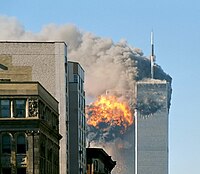
Photo from wikipedia
I employ Steps-to-War theory to analyze interstate wars in the Middle East by adding an additional escalating step: state sponsorship of non-state actors. Remarkably, however, the present scholarship completely overlooks… Click to show full abstract
I employ Steps-to-War theory to analyze interstate wars in the Middle East by adding an additional escalating step: state sponsorship of non-state actors. Remarkably, however, the present scholarship completely overlooks a comprehensive assessment of the impacts and roles of state-sponsored terrorism on escalation of interstate militarized conflicts. None of the conflict studies focuses on state-sponsored terrorism and escalation of interstate conflict. This gap still exists despite a remarkable growth in the conflict literature. This article argues that the Steps-to-War thesis is a useful framework for understanding why states end up fighting wars by answering the questions: How does state-sponsored terrorism escalate interstate conflict? And how does each step intertwine with other steps and make war more likely? This paper’s primary argument is that state-sponsored terrorism increases the likelihood of war by providing another escalating step in conjunction with other steps and, therefore, aligns with Steps-to-War theory, and is one of the leading escalating factors. Ultimately, this article argues that this claim has a solid basis, and the Middle Eastern cases vividly demonstrate the escalatory ability of state-sponsored terrorism because state-sponsored terrorism interacts with and reinforces other escalating factors.
Journal Title: Journal of Asian and African Studies
Year Published: 2020
Link to full text (if available)
Share on Social Media: Sign Up to like & get
recommendations!